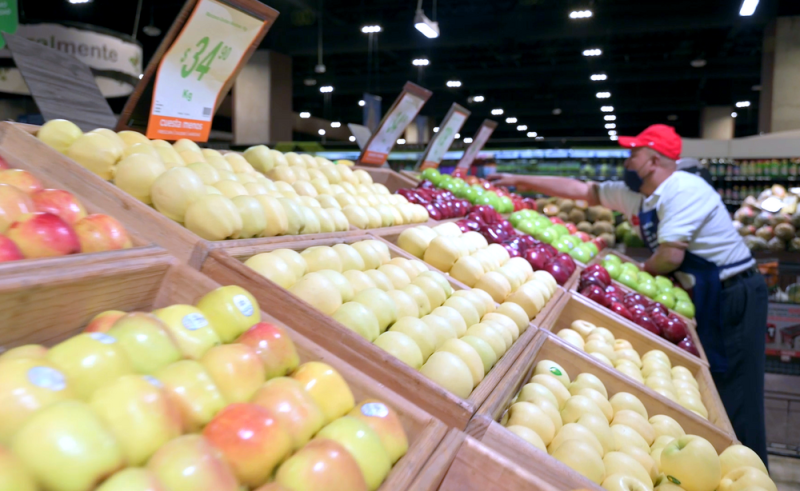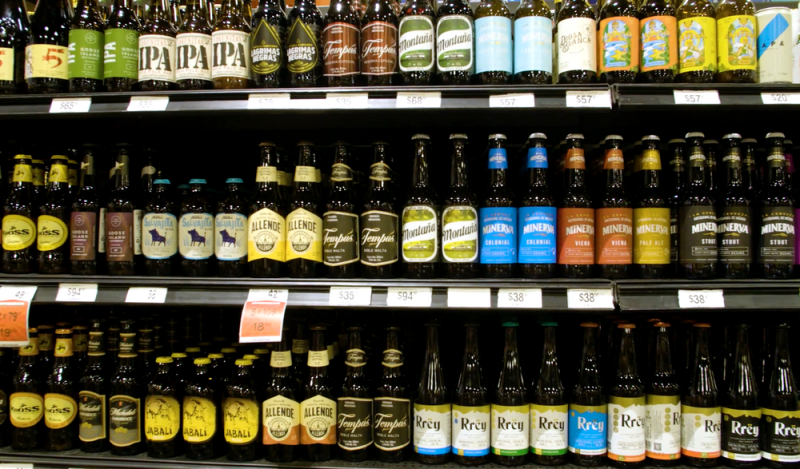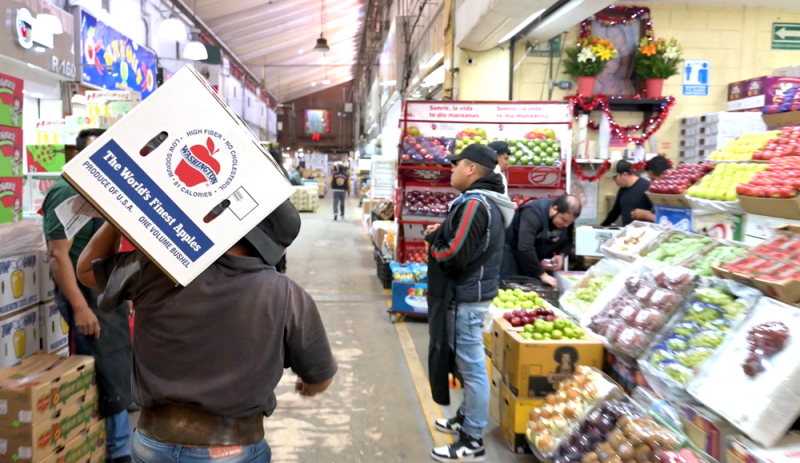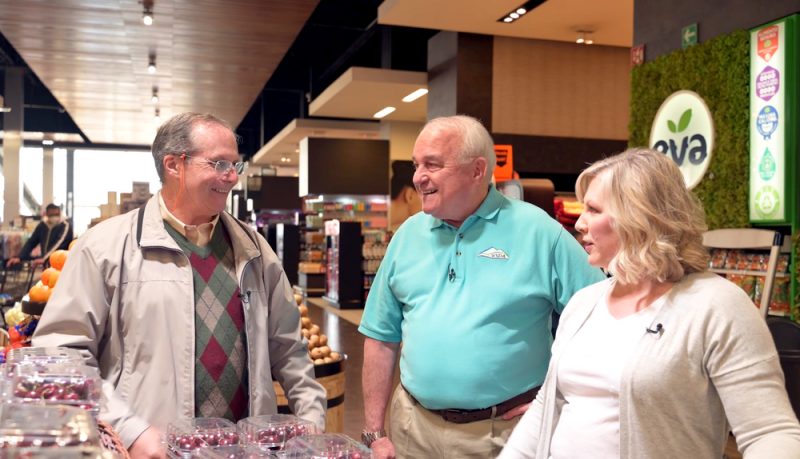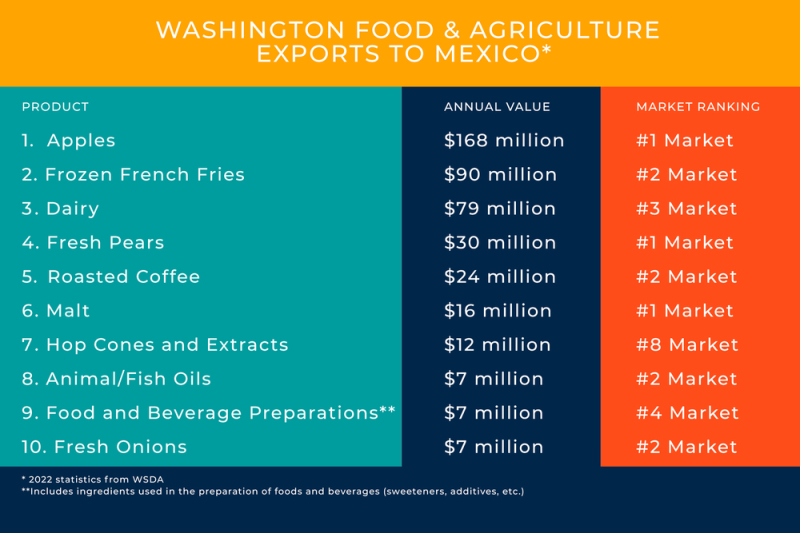Washington’s Produce Pipeline To Mexico
Grocery stores throughout Mexico depend on Washington’s natural abundance for their papas, cerveza, manzanas, and more.

IN A BRIGHT, SPACIOUS GROCERY STORE in Mexico City, aisles of locally grown fruits, fresh fish, and dried peppers open up to a familiar sight for Washingtonians: rows of apples, cherries, and pears grown in Washington state. It’s not surprising to find so much Washington produce here, given that Washington is a major exporter of everything from potatoes to hops, but it can be hard to imagine how, exactly, a Golden Delicious apple travels from a Northwest farm to a grocery cart in Mexico City.
First, of course, we start with the farmers. Washington apple farmers export about 30% of their crops worldwide, with a large percentage going to Mexican consumers. Potato farmers export more than 70% of their potatoes, mostly in the form of frozen french fries, and cherry farmers export about 25%.
On a visit to Mexico City, the Washington Grown team headed to the grocery store to see what Washington goodies they could find. Mark Hammer, a potato farmer and member of the Washington Potato Commission, scanned the freezer section and spotted several bags of frozen french fries made by companies he supplies.
“I feel a little bit at home seeing the product here,” he said. “As a grower, it’s super rewarding to see our product down here in Mexico and see that the popularity of french fries is blowing up across the country.”
Derek Sandison, the director of the Washington State Department of Agriculture (WSDA), added that you’ll find Washington-grown french fries all over the world.
“Chances are if you go into a McDonald's restaurant in Japan, for example,” he said, “the french fry you’re eating is from Washington!”
Washington farmers export their goods through wholesale traders, who source produce from all over the world to import into their country. Ernesto Cardona, the fourth-generation CEO of Austral Trading in Mexico City, said his company imports more than 45 kinds of apples and about 15 varieties of pears from Washington state to Mexico.
“The fruit from Washington is the best fruit because of the flavor, because you can store it for a while, and because of the varieties,” he said, adding that for pears and apples, “consumption is increasing a lot in Mexico because we’re looking for the best for our bodies and for our health.”
After the produce is imported, it’s unloaded from the trucks into wholesale markets like Mexico City’s Central de Abasto, where retailers source the food they sell in their shops.
Juan Carlos Moreira, the Mexican representative for Washington apples and cherries, looked up at boxes of Golden Delicious apples stacked high at Central de Abasto. He said retailers will buy anywhere from a few boxes to several pallets at a time.
“People come to these warehouses every single day — imagine that,” he said. “You can have a truckload with apples here in less than a week.”
Since Mexico isn’t a self-sufficient producer of apples, he said, the country needs to import them from places like Washington, whose apples are popular with Mexicans because of the uniform size, beautiful color, and great crunch. “Washington apples are the best match.”
From the wholesale market, the fruit makes its way to grocery store shelves, where customers often cannot wait to get a taste. In the cherry section at the Mexico City store, Moreira said that Mexican customers get especially excited for Washington cherry season.
“Washington cherries have a fantastic explosion of flavor,” he said. “They have a larger size (than other competitors' cherries), and the color is so intense. Since it’s a very seasonal product, we take the circus approach, where we say, ‘The circus is coming! The circus is coming!’ So, ‘Northwest cherries are coming — you will see them in your retail stores very soon!’”
In another aisle of the store, Sandison of the WSDA browsed shelves of locally brewed beer, which he said Mexico exports all around the world.
“They use a lot of Washington hops in the production of the craft brews down here,” Sandison said, adding that 70 to 80% of the hops grown in the U.S. are from Washington state, specifically the Yakima Valley. “Our hops make good beer — and the world knows it.”
Cardona, of Austral Trading, said he loves to visit Washington and see all the advances that are being made in every part of the export process.
“I feel good because I see how the growers and the packers are developing the infrastructure and all the things to increase the quality, the volume,” he said. “It’s amazing.”

